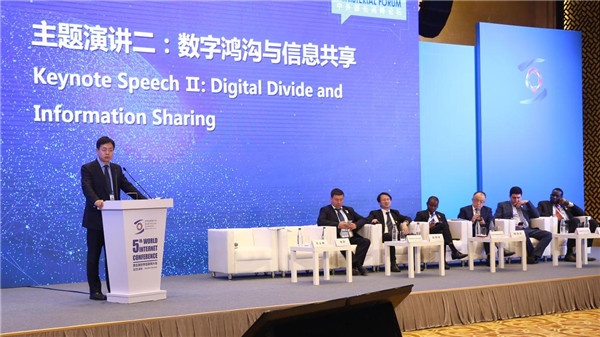Digital economy can foster growth and bridge divide


A guest at the Ministerial Forum on "Bridging the Digital Divide", a sub-forum of the Fifth World Internet Conference, delivers a speech. ZOU HONG/CHINA DAILY
At the forum, Chinese officials also shared their experiences in expanding internet coverage, in the hope of helping rural residents enjoy a wide range of digital services such as shopping online.
Zhang Fuhai, a member of the Standing Committee of the Liaoning Provincial Committee of the Communist Party of China and the province's top publicity official, said as a major industrial base in China, Liaoning province used to see slack development of its digital economy.
"But in recent years, we have striven to bridge the digital divide within the province and seize the opportunity of digitalization to boost the local economy. Specifically, we have actively developed information technologies to update our industrial enterprises and foster new growth momentum such as software development," Zhang said.
"We realize information exchange and the application of new technologies are two keys to expanding internet coverage. Also, a sound network infrastructure and pro-business environment are also needed to underpin the process," he added.
Such an intensified push to overcome the digital divide also comes as technologies are playing a strategic role in buoying growth and innovation. According to the European Commission, a 10 percent increase in broadband penetration increases GDP by 1 to 1.5 percent.
Also, boosting digital inclusion can also increase the quality of life of individuals by facilitating access to services and the economic possibilities for local businesses, ultimately improving cohesion, according to a report by the European Parliament.
Garba Shehu, senior special assistant to the President of the Federal Republic of Nigeria on Media and Publicity, said the country is making accelerated efforts to reduce the digital divide, a push assisted by Chinese companies including Huawei Technologies Co Ltd.
MOST POPULAR
- 1 $39.7 billion worth of deals inked at Airshow China
- 2 China announces tax relief measures to stabilize real estate sector
- 3 A look at China's economy in October, 2024
- 4 Public holiday extension announced
- 5 China's NEV annual production hits 10 million milestone amid global carbon reduction efforts
Editors' Picks
 Infographic:
Golden jubilee of China-Brazil relations
Infographic:
Golden jubilee of China-Brazil relations
 Infographic:
A look at China's economy in October, 2024
Infographic:
A look at China's economy in October, 2024
 Infographic:
G20 at a glance
Infographic:
G20 at a glance
 Video:
Peru sees new port open
Video:
Peru sees new port open



